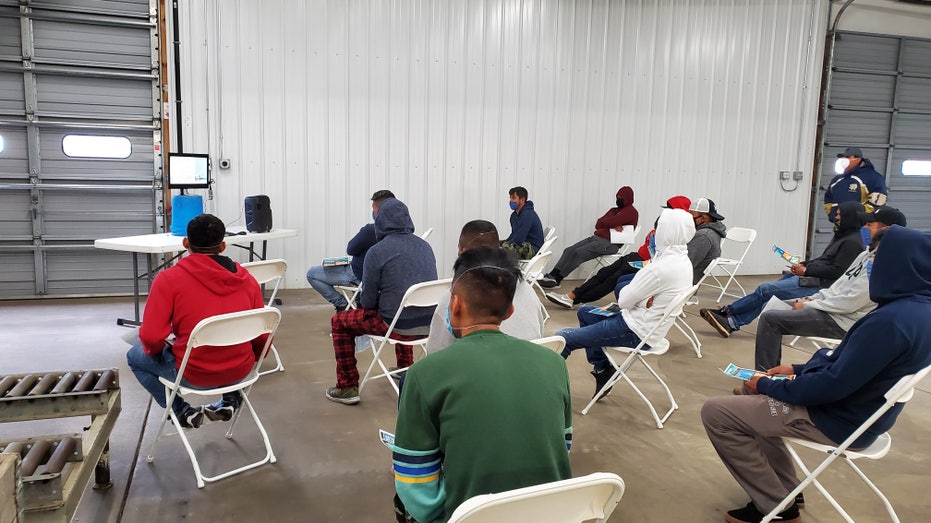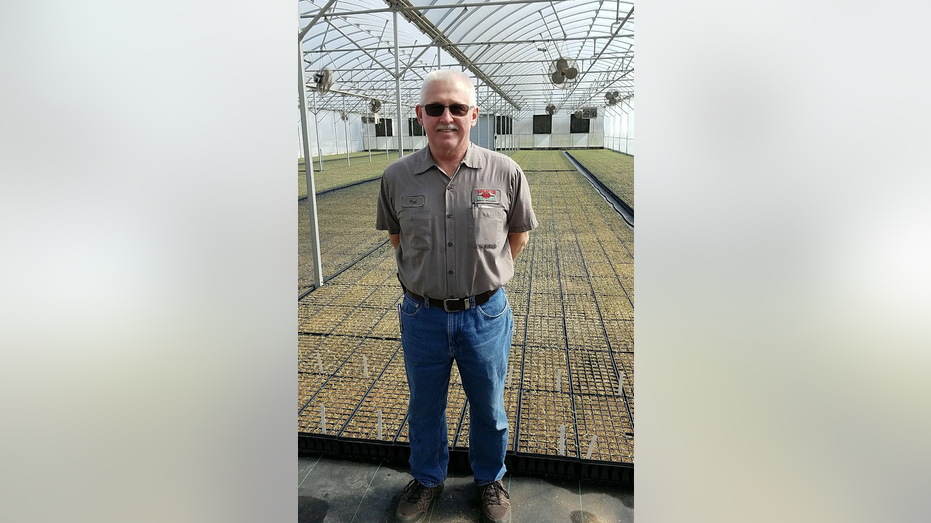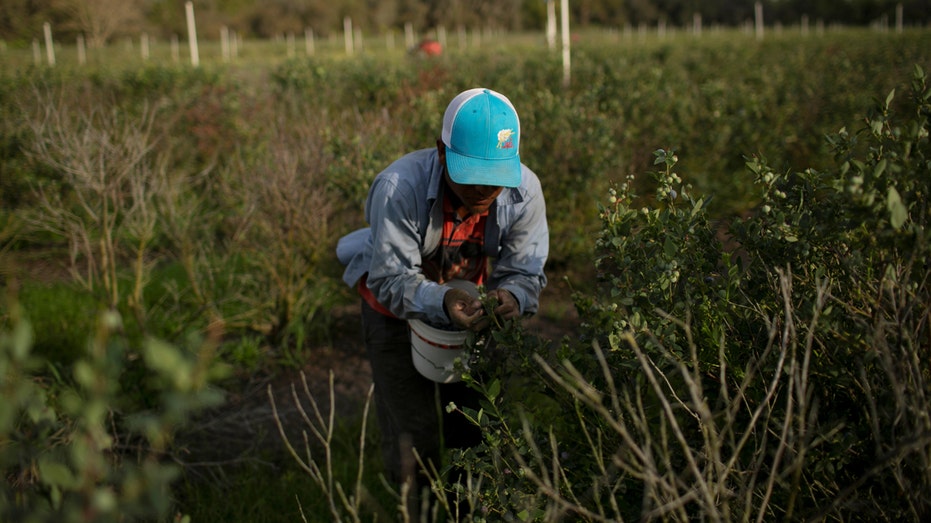Trump farmer: America's food supply in danger if we don't use immigrant workers legally
There’s a direct line between having guaranteed labor and being able to pivot to meet the changing needs of this new crisis
Get all the latest news on coronavirus and more delivered daily to your inbox. Sign up here.
The novel coronavirus has given Americans their first taste of broad-scale food insecurity. It’s a problem that could impair our country beyond the current crisis. In fact, it could become the new normal unless we save American farming.
As a fourth-generation Michigan farmer, I’ve seen domestic agriculture lose its competitive edge as tighter borders have choked our labor pipeline and cheaper foreign producers have captured the majority of the market.
CORONAVIRUS MEAT SHORTAGE THREATENS KANSAS CITY BBQ JOINTS
Now, COVID-19 has further disrupted our distribution channels, causing a jump in demand from grocery stores and plummeting demand from wholesale markets like restaurants and schools.
For many commercial farms like mine, the produce we sell typically gets split in half between the two markets.
The global pandemic is forcing us to innovate and think of ways we can adapt to the changing demand model.
Farms are already struggling under the existing pressure of worker shortages and a cutthroat market; they don’t have the bandwidth or labor to pivot so sharply.
I’m a conservative Republican who voted for Trump, and I firmly believe that we need a streamlined immigration system that welcomes foreign-born visa workers where needed.
I’m one of the lucky ones. For now, my commercial fruit and vegetable farm will move forward with full-scale production. And I’m only able to do this because of the committed immigrant farmworkers tending my fields.
There’s a direct line between having guaranteed labor and being able to pivot to meet the changing needs of this new crisis.
Most farms these days falter or fail because immigration restrictions and a loss of interest in farm work among Americans has drastically decreased the labor supply. That’s why, when my first group of migrant workers bounded off the bus wearing facemasks in early April, I gave them a warm welcome and thanked them profusely for showing up to work.

In this April 22, 2020 photo H2A immigrant workers from Monterey, Mexico attend a training session at Michigan farmer Fred Leitz's farm. (Fred Leitz)
Many were happy for a job, but apprehensive about traveling to Michigan, now a COVID-19 hot spot.
I’m a conservative Republican who voted for Trump, and I firmly believe that we need a streamlined immigration system that welcomes foreign-born visa workers where needed.
COSTCO, KROGER RATIONING MEAT AMID CORONAVIRUS SHORTAGE FEARS
Every American should be grateful for the immigrant farmworkers risking their lives to feed our families during a global pandemic.
In 2018, immigrants were more than 27 percent of all agricultural workers in the United States, according to New American Economy. They are over 48 percent of all field workers and over 73 percent of all hand packers and packagers.

Michigan farmer Fred Leitz
These immigrants tend to be younger than the average working-age American. That matters to places like Michigan, where our rapidly aging population and departure of young people has caused a severe decline – the worst in the country, in fact – in our U.S.-born prime working age population.
Immigrants serve as a vital lifeline to our labor supply. And in today’s climate, immigrant farmworkers are less likely to be sheltering in place.
I’ve seen this at a few greenhouses lately. One owner told me he was so grateful to migrant workers because they’re the only ones showing up to work.
CORONAVIRUS MEAT SHORTAGE THREATENS KANSAS CITY BBQ JOINTS
The average citizen does not see the risks these workers take to get here. In recent weeks, temporary visa holders risked virus exposure in airports, enclosed airplanes and, once they arrived in the U.S., on public transportation.

A Mexican migrant worker picks blueberries during a harvest at a farm in Lake Wales, Florida, U.S., March 31, 2020. Picture taken March 31, 2020. REUTERS/Marco Bello
Domestic workers traveling to Michigan from places like Florida or Texas faced similar risks as they stopped to work at farms along their northbound path.
Migrant workers have also reported getting pulled over and harassed by the police, which adds to their fear and increases the odds of infection. When they finally arrived, some realized they were jobless, because the farm owners who typically serve restaurants and schools had cancelled production.
It would be much easier to get these migrant workers on our payrolls and create a stable, reliable labor force if so many of them weren’t undocumented—roughly half of all farmworkers in the United States currently lack papers.
That puts an unfair burden on the farmers who desperately need the labor but who don’t want to flout the law. Allowing these workers to come out of the shadows—letting them live freely, drive and participate in the legal system—is squarely in our economic interest.
Farming is tied to so many other streams of business, such as transportation and packing. The shortage of farmworkers has cost the U.S. economy $3.1 billion in additional fresh produce sales per year for growers, $2.8 billion in additional spending each year on related services and roughly 41,000 more American jobs in non-farm sectors, according to research of 2014 data by NAE.
In recent weeks, I’ve received calls from every lawmaker I know, worried that cuts in domestic farm production would signal long-term food shortages and stoke panic in Americans.
GET FOX BUSINESS ON THE GO BY CLICKING HERE
I’m glad that the U.S. Department of Homeland Security finally declared farmworkers “essential,” but it’s not enough.
To prevent lasting and severe food insecurity, we need the government to make farmers whole this year, so that we can make our basic payments and stay in business.
We need to overhaul the costly and cumbersome H-2A visa program. And finally, we must have a clear, legal path for more farmworkers to come legally to the United States.
If the government is serious about protecting American food security so that we’re not dependent on foreign producers and governments, all of these things need to come together.
For years, I’ve been a vocal advocate for sensible immigration policies that protect American agriculture and the workers who keep our industry afloat.
Given their contributions to this nation, the undocumented should get work authorization---maybe there’s a way to get them in line for citizenship, they certainly deserve it. They are the backbone of our food supply. Without them, Americans’ food insecurity will be here to stay.
Fred Leitz is a farmer and a past president of the National Council of Agricultural Employers who lives in Sodus, Michigan.




















